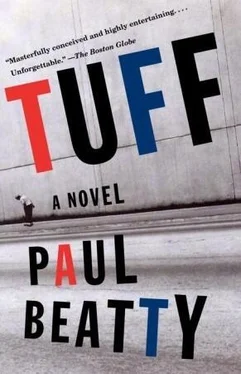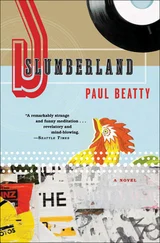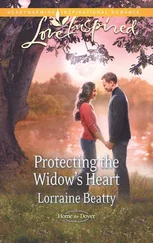Somehow, one boy, Dark, a fresh-off-the-Greyhound-bus émigré from Duarte, California, left the robbery with pearls of errant masturbatory ejaculate in his hot combed hair. Eager to diffuse the taunts of the other boys and prove that his thick pigtails were “gangster” and not “sissified,” he backtracked four blocks and found the victim reporting the crime to two patrolmen. Ignoring the officers, Dark began pummeling the man, shouting, “You got sperm in my perm, now I’m full of germs.” Winston was rolling on the sidewalk in a fit of laughter when the police handcuffed him. He snickered all the way to the police station: “AIDS in my braids, now I’ll never get laid!” Giggled through the fingerprinting: “Nut on my haircut, like I been butt-fucked!” The city went through a roll of film before finally settling on a mug shot of him sporting an Uncle Ben smile, tears running down his face.
Things ceased to be funny when the cops refused to believe that a boy Winston’s size could be thirteen, and since budget cuts had made night court a liberal memory, he’d have the weekend on Rikers to prove his identity. It didn’t take long. Winston disembarked from the bus, suffered through the indignities of a strip search, and strolled into building C-64. There, playing toilet-paper checkers on a bunk underneath the clock, was a double-jumping birth certificate: his father. Father and son played checkers with rolled-up balls of toilet tissue, arguing about who would call the wife, the mother. “I haven’t spoken to you or her in three years, I didn’t go to your sister’s funeral, so phone her, boy.”
“Fuck you. King me, bitch.”
Unlike Winston’s father, Patrice Foshay kept her promises. The last one, delivered behind an ironing-board pulpit, was: “Winston, you keep getting into trouble, I’m not going to kick you out the house, I’m going to leave my damn self and you’re not coming with. You’ll be living on your own. Understand?” Monday morning Mrs. Foshay posted bail on the two delinquents. She dropped Clifford off at his girlfriend’s, raised a “Power to the People!” fist in the air, and moved to Atlanta, assuring Winston she’d send rent and food money until he turned eighteen.
It took Winston two years to move his belongings into his mother’s bedroom. When the phone rang every two weeks at precisely ten o’clock, after the black sitcoms went off the air, his mother would ask why he couldn’t be more like “those nice boys on TV.”
Winston was just finishing the tale of his dysfunctional upbringing with a blasphemous “Fuck a Cosby” when an immense marble-white yacht christened Jubilee in bold black letters sailed alongside the tour boat. With sleek helicopters perched bow and stern and a radar dish spinning above the bridge, the boat looked more like a war vessel than a luxury craft. “So you’re all alone?” Yolanda asked. Winston shrugged, his gaze cast out toward the bay. Yolanda knew the right thing to do was to put her head on Winston’s pillowy shoulder and say, “No, you aren’t.” But she had long since learned to let the man make the first conciliatory move. Instead she filled the uncomfortable silence with cynicism: “Every nigger’s father say they was in the Panthers. And if they was, they didn’t do shit but hand out flyers.”
“Crazy? Nigger was down.” Winston flipped open his wallet and showed her a photo of a goateed black man dressed beret-to-boots in black, crouched behind a Volkswagen Beetle, his leather-gloved hands positioned over the hood, aiming a shotgun at some unseen enemy of the Revolution. Yolanda grabbed the wallet and fawned over the Polaroid. “Yo, your pop groovier-than-a-motherfucker. Look at those pointy kicks and the tight-ass straight legs.” She flipped through the rest of the wallet, pausing at the food-stamp ID card to verify that Winston wasn’t lying about his age. She studied the more recent photos of Latino and black boys grouped around firearms, posing in front of London-gray school lockers. Interspersed with the group shots were portraits of the same solemn-faced teens at the steering wheel of the communal vehicle or the local arcade, looking directly into the camera, holding the pistols to their temples. Winston introduced the boys on the block by proxy: “Rude, Kooky, Shorty-Wop, Point Blank — right there’s my ace, Fariq.” Going through the contents of Winston’s wallet, Yolanda realized what made him attractive, other than his cute button nose. He was comfortable with who he was and wasn’t. You don’t meet too many casual black people. Winston was honest — maybe not with the rest of the world, but he was honest with her and himself. He didn’t embellish or rationalize his exploits, talking in pipe-dream slang about him and the crew “coming up,” “blowing up,” “bubbling,” and “living large.” No sob-story brooding about inner-city lassitude—“You can’t understand, it be mad crazy stress on a nigger”—as if Yolanda were on the outside looking in on a black man’s world. She understood self-pity and self-doubt; there was no need to talk over her dookie-braided head.
Yolanda tapped a purple-and-pink fingernail on the food-stamp ID and said, “You mind?”
“No, everybody at the store know me. Go ahead.” As she slipped the card from the plastic holder, Yolanda noticed there was another photo tucked underneath it. Oh, my competition, she thought; then she noticed it was a picture of a gray-haired woman who looked to be in her late fifties. She was standing in front of the Apollo Theater. Snuggled next to her, a young Winston, his nappy head resting atop her pageboy.
“Who’s this Oriental lady?”
“Asian.”
“Who is she?”
“Ms. Nomura. She’s my unofficial guardian. She looked out for a nigger after Moms jetted.”
“Mmm-hmm.”
Yolanda handed the billfold back to Winston and turned her attention to the partygoers dancing on the Jubilee ’s poop deck, one ear cocked for the explanation. “Yolanda, you ain’t got nothing to be salty about — Ms. Nomura like my auntie. She live right across the street, knew my father when he was in the Panthers. I told you, she’s like my second mother. If you jealous of a sixty-year-old, you got issues.”
Yolanda folded her arms and peered out the porthole window. “Fucking boat move too slow.” Winston pulled a bright orange life jacket from underneath the bench and carefully slipped it over Yolanda’s head, fastening the buckles across her chest and knotting the cotton straps behind her back. Yolanda’s shoulders visibly relaxed. Oh, this fat motherfucker smooth, she thought.
Winston flamboyantly doffed his jacket and cloaked it over Yolanda’s shoulders. He was entering player mode and about to unleash his rap, the rap being the black man’s equivalent of a lion tamer’s whip crack to straighten out a headstrong feline, or a Buddhist monk’s koan to further confuse a disciple. What’s the sound of one man rapping? “Yolanda, stop fronting. I can tell by your reaction you in a brother’s corner. That’s on point, but let’s not play no games. We all need to be rescued to some extent. You going to school, that’s rescuing yourself. Just seeing a strong black woman such as yourself going head-up with the bullshit makes me wonder what can I do to straighten my game out. So listen here, I ain’t now, and never will, trip off nothing in your life that makes your life better. That’s not a promise, that’s factoid, baby. Like the sky is blue, the summer’s hot, and you fine as hell. No question. Ms. Nomura is like this life jacket, kept me afloat when times was hard. But I was just bobbing up and down in the stormy sea of the streets. You’re my rescue ship plucking me out of the water — all ahoy-and-shiver-me-timbers like.”
Читать дальше












